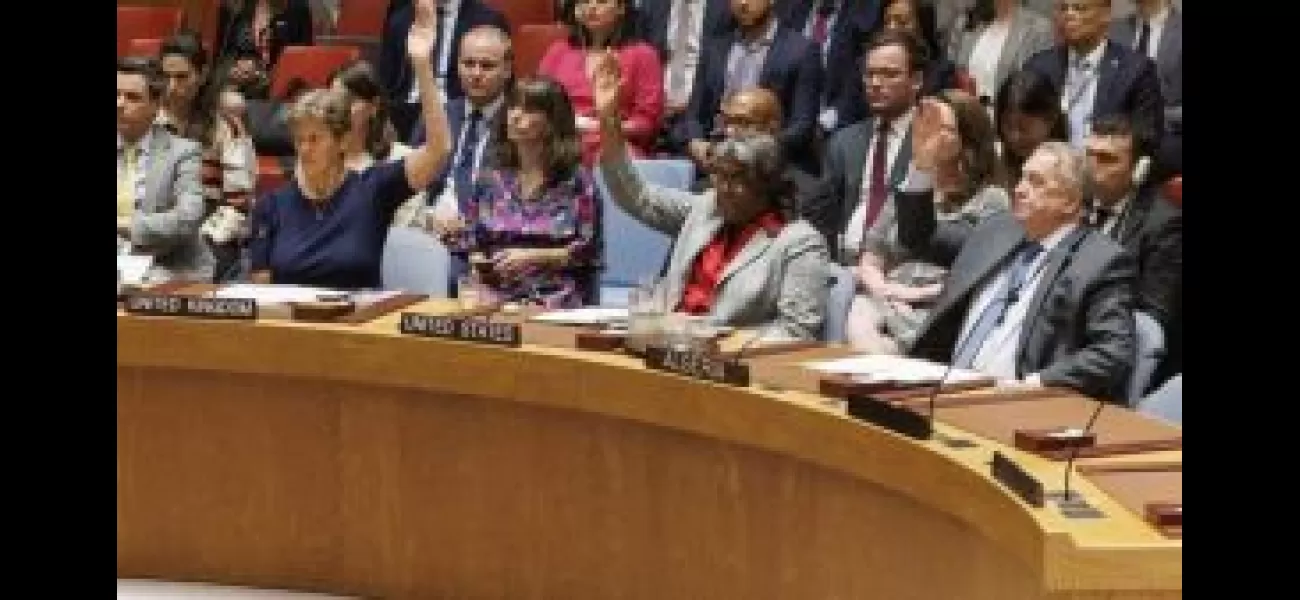A small sign of optimism or possibility in a difficult situation.
The United Nations Security Council has passed a resolution endorsing a US-proposed ceasefire to put an end to Israel's nine-month attack on Gaza. The vote was 14-0 with Russia abstaining.
June 11th 2024.

It seems like there is finally a ray of hope in the midst of all the chaos and destruction. The United Nations Security Council has recently voted in favor of a ceasefire proposal, backed by the United States, to bring an end to the nine-month long attack on Gaza by Israel. The vote was a resounding 14-0, with only Russia choosing to abstain due to lack of information about the details of the proposal.
The world has been anxiously waiting for this moment, as the conflict has taken a heavy toll on the lives of civilians in Gaza and has left thousands of Palestinians injured every day. Despite international appeals and pressure to stop the violence, Israeli Prime Minister Benjamin Netanyahu remained adamant on destroying Hamas and their military capabilities. It seemed like peace was out of reach, as Israel continued to be consumed by anger and refused to listen to reason.
The resolution passed by the UNSC is based on a three-phase plan put forward by US President Joe Biden. The first phase involves a six-week ceasefire and the exchange of captives between Israel and Gaza. The second phase includes a permanent ceasefire and the release of the remaining captives, while the third phase focuses on the reconstruction of Gaza. The ultimate goal of the resolution is to establish a two-state solution, with a separate Palestinian state encompassing both Gaza and the West Bank.
The US claims that Israel has accepted the proposal, although some Israeli officials have stated their intention to continue the war until Hamas is completely eliminated. The resolution also calls on Hamas to accept the plan, to which they initially responded positively. It urges both parties to implement the terms of the proposal without delay or conditions.
Hamas has been quick to welcome the resolution and has expressed their willingness to cooperate with mediators and engage in indirect negotiations for the implementation of the agreement. As the resolution holds weight in international law, it may not be perfect but it is certainly the most practical solution put forward so far.
Hamas has repeatedly stated that any deal must result in a permanent ceasefire, complete withdrawal of Israeli forces from Gaza, an end to the Israeli blockade, and a fair exchange of captives between Gaza and Israel. It remains to be seen whether Israel and Hamas will agree to move forward with the proposal, but the strong support from the UNSC puts added pressure on both parties to accept it.
For the US administration, the resolution is of utmost importance. If successful, it would be a major achievement for President Biden and could potentially give him an edge in the upcoming presidential election. This is why he is leaving no stone unturned to convince his friend and ally, Netanyahu, to agree to a ceasefire.
Prior to the vote, Hamas and Palestinian Islamic Jihad leaders met in Qatar to discuss the proposed deal and outlined their expectations. The Arab representative on the council, Algeria's UN Ambassador Amar Bendjama, summed up the significance of the resolution when he stated that while it may not be perfect, it offers a glimmer of hope for the Palestinian people. The alternative is the continuation of the killing and suffering of innocent civilians.
Diplomacy now has a chance to bring an end to this long-standing conflict, and it is hoped that this will also ease the global economic crisis that has been exacerbated by the ongoing violence in the Middle East.
The world has been anxiously waiting for this moment, as the conflict has taken a heavy toll on the lives of civilians in Gaza and has left thousands of Palestinians injured every day. Despite international appeals and pressure to stop the violence, Israeli Prime Minister Benjamin Netanyahu remained adamant on destroying Hamas and their military capabilities. It seemed like peace was out of reach, as Israel continued to be consumed by anger and refused to listen to reason.
The resolution passed by the UNSC is based on a three-phase plan put forward by US President Joe Biden. The first phase involves a six-week ceasefire and the exchange of captives between Israel and Gaza. The second phase includes a permanent ceasefire and the release of the remaining captives, while the third phase focuses on the reconstruction of Gaza. The ultimate goal of the resolution is to establish a two-state solution, with a separate Palestinian state encompassing both Gaza and the West Bank.
The US claims that Israel has accepted the proposal, although some Israeli officials have stated their intention to continue the war until Hamas is completely eliminated. The resolution also calls on Hamas to accept the plan, to which they initially responded positively. It urges both parties to implement the terms of the proposal without delay or conditions.
Hamas has been quick to welcome the resolution and has expressed their willingness to cooperate with mediators and engage in indirect negotiations for the implementation of the agreement. As the resolution holds weight in international law, it may not be perfect but it is certainly the most practical solution put forward so far.
Hamas has repeatedly stated that any deal must result in a permanent ceasefire, complete withdrawal of Israeli forces from Gaza, an end to the Israeli blockade, and a fair exchange of captives between Gaza and Israel. It remains to be seen whether Israel and Hamas will agree to move forward with the proposal, but the strong support from the UNSC puts added pressure on both parties to accept it.
For the US administration, the resolution is of utmost importance. If successful, it would be a major achievement for President Biden and could potentially give him an edge in the upcoming presidential election. This is why he is leaving no stone unturned to convince his friend and ally, Netanyahu, to agree to a ceasefire.
Prior to the vote, Hamas and Palestinian Islamic Jihad leaders met in Qatar to discuss the proposed deal and outlined their expectations. The Arab representative on the council, Algeria's UN Ambassador Amar Bendjama, summed up the significance of the resolution when he stated that while it may not be perfect, it offers a glimmer of hope for the Palestinian people. The alternative is the continuation of the killing and suffering of innocent civilians.
Diplomacy now has a chance to bring an end to this long-standing conflict, and it is hoped that this will also ease the global economic crisis that has been exacerbated by the ongoing violence in the Middle East.
[This article has been trending online recently and has been generated with AI. Your feed is customized.]
[Generative AI is experimental.]
0
0
Submit Comment





